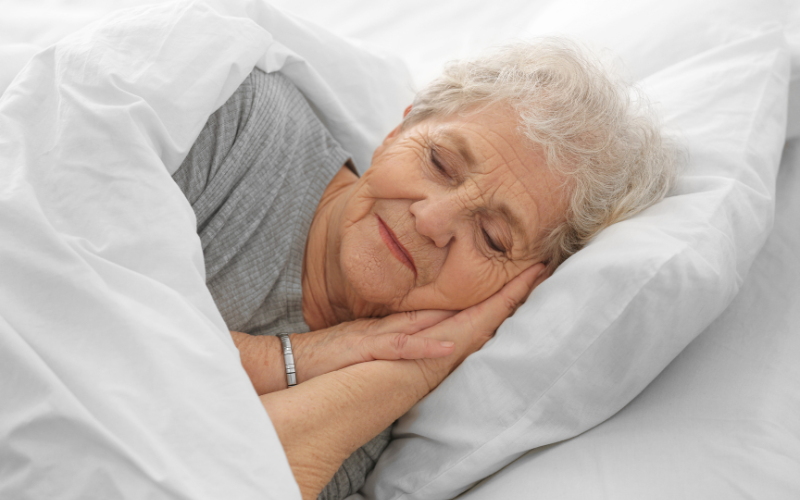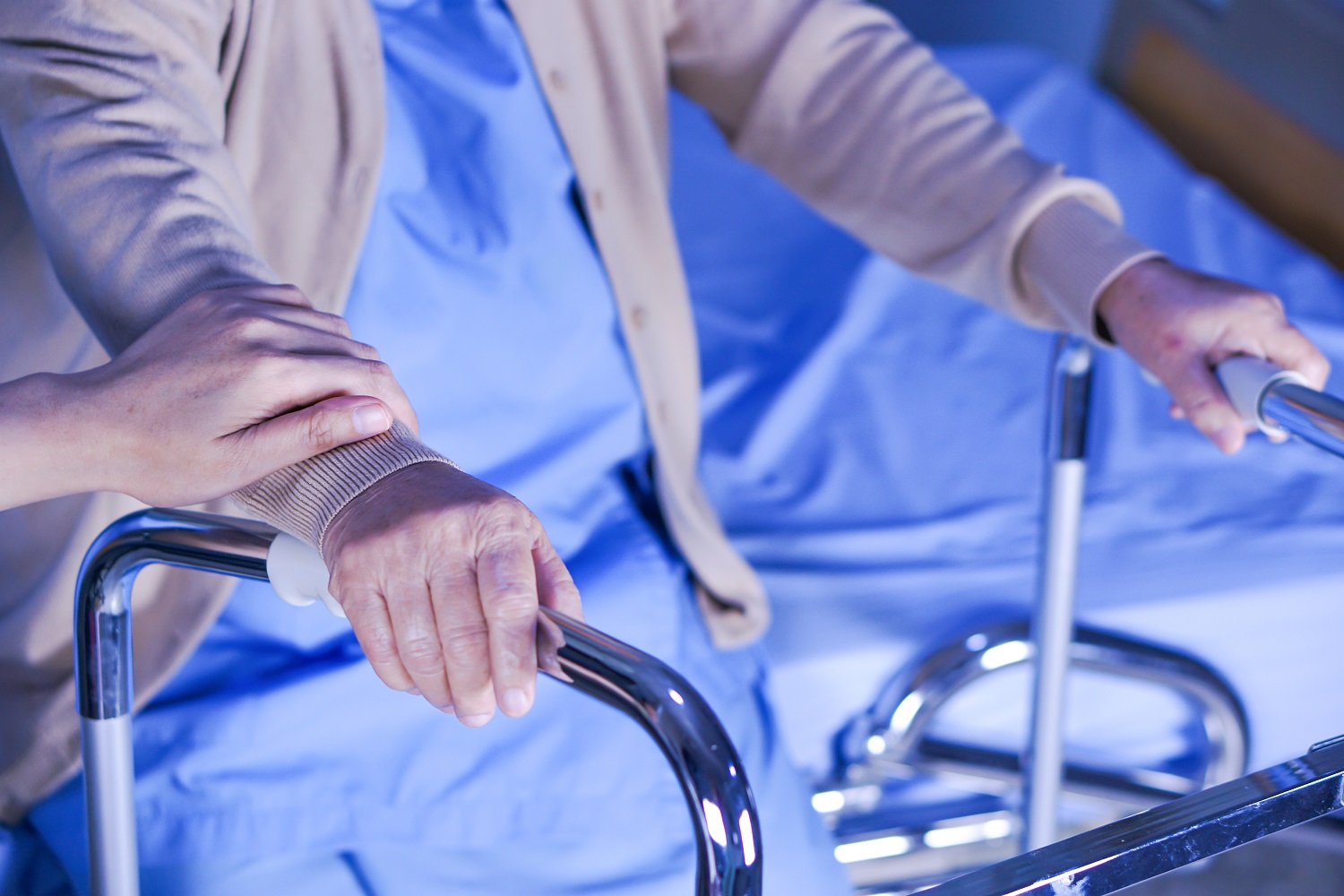
Quality sleep is essential for a healthy, aging brain. But the position in which seniors choose to sleep can also significantly affect brain health. Sleeping on one’s side is shown to remarkably reduce a senior’s risk for dementia and facilitate sharper cognitive skills.
Every older adult needs at least seven hours of restful sleep each night, per the Centers for Disease Control. A good night’s rest is as important as exercising regularly and eating a balanced diet. Overall health, mood, and brain performance are improved with a good night’s sleep.
On the other hand, a lack of regular quality sleep can have a detrimental effect on the health of older men and women. People who do not receive sufficient sleep increase their risk for diseases, such as heart disease, obesity, stroke—and dementia.
How does sleep affect the brain?
Sleeping impacts brain health in numerous ways. Even during sleep, the brain continues to function, preparing the aging person for tasks, such as learning, creating and remembering. The brain’s drainage system removes toxins during these seven hours of uninterrupted sleep.
The drainage system is key when it comes to brain health and optimal cognitive functioning. Brain waste, especially beta-amyloid proteins, must be taken out—and this is done via the brain’s glymphatic pathway. Beta-amyloid proteins consist of the plaques associated with Alzheimer’s disease.
How is sleep posture linked with dementia?
Sleep posture may impact the level of risk a senior has for developing a neurological disease, like Alzheimer’s. Researchers find that side sleeping, as opposed to sleeping on one’s stomach or back, is the ideal sleeping position that allows the brain to efficiently remove waste from its system.
Sleeping on one’s side is considered the healthiest way to sleep. This posture provides sufficient support for the spine, while minimizing acid reflux. As mentioned, this lateral sleep position is the most effective for eliminating metabolic waste that accumulates in the brain during waking hours.
The nighttime flushing of the brain’s toxic waste that accumulates in the central nervous system is achieved via the cerebrospinal fluid that surrounds the brain and spinal cord. Sleeping on one’s side helps the heart pump cerebrospinal fluid more efficiently.
A wide range of dementias are associated with disturbances in sleep, such as insomnia or difficulty falling asleep. These sleep disturbances, in turn, quickly accelerate memory loss in older people suffering from dementias, such as Alzheimer’s disease.
While sleeping on one’s side is better for reducing the risk for developing dementia, researchers from the University of Rochester Medical Center go further by recommending that aging adults sleep on their right side. Sleeping on the right side helps the waste clearance system function optimally.
Conversely, sleeping on one’s back (also known as the supine position) is deemed unhealthy. The supine position results in lower brain oxygenation, due to the fact that blood movement into and out of the brain is reduced and lung efficiency decreases.
In fact, sleeping in the supine position with the head at body level for more than two hours per night is found to quadruple a senior’s risk for developing dementia. Despite age, gender, snoring, or a diagnosis of sleep apnea, this heightened risk for dementia remains consistent.
Seniors who sleep on their backs are urged to change their normal sleep position. The goal during sleep is to improve blood flow and oxygen saturation in the brain—and this is best achieved when older adults habitually sleep on their side, preferably their right side.
What helps seniors sleep on their side?
A good set of side-sleeping pillows can help aging individuals change their sleep position to one that is recommended by health professionals. The pillow helps align the cervical spine so that the neck does not bend and the neck muscles do not tighten during sleep.
Furthermore, in order to keep the body aligned while the senior sleeps, the side-sleeping pillows must not be excessively thick or thin. The older adult’s head should not be tilted up or down during sleep. A caregiver can check the senior’s position to see whether the spine is in alignment.
The ideal pillow is one that fills the five-to-six-inch gap between the senior’s ear and shoulder. Aging people who experience neck pain during sleep will benefit from additional support, such as a neck bolster or a scoop. Caregivers should provide these supports to enhance the senior’s sleep.
The foundations of healthy sleep are the amount, quality, and consistency of sleep. A good night’s rest involves more than lying in bed. The senior must receive seven hours or more of uninterrupted sleep and remain on a regular sleep schedule, one that a caregiver can help establish.
Sleep and the sleeping position can affect a senior’s risk for developing dementia. While regular sleep is important for feeling refreshed the next day, sleeping on one’s side helps the senior’s brain eliminate waste and reduce the chances for developing dementia.
Dementia Care from Assisting Hands

When your elderly loved one needs extra help to ensure quality sleep, turn to the dementia caregivers at Assisting Hands Home Care. We can set up a regular sleep schedule, help the senior with a bedtime routine and check his sleeping position.
Memory care from our home care agency includes a number of additional services designed to enhance the lives of seniors diagnosed with Alzheimer’s disease or other forms of dementia. Our caregivers are trained to identify dementia symptoms and respond with compassion.
We discreetly assist seniors with incontinence issues, calm agitated dementia patients, and return wandering adults to safety. Our non-medical care also includes transportation to doctors’ offices, grocery shopping, meal preparation, medication reminders, light housekeeping, and pleasant companionship to deter loneliness and social isolation.
Choose Assisting Hands Home Care for the most reliable Alzheimer’s and dementia care in Deerfield, IL | Lake Zurich, IL | Lake Forest, IL | Lincolnshire, IL | Vernon Hills, IL | Highland Park, IL | Libertyville, IL | Round Lake Beach, IL and the surrounding areas. Families feel peace of mind knowing an experienced caregiver supervises the care recipient at all times in the comfort of home. Call to schedule an in-home consult and start memory care today.















